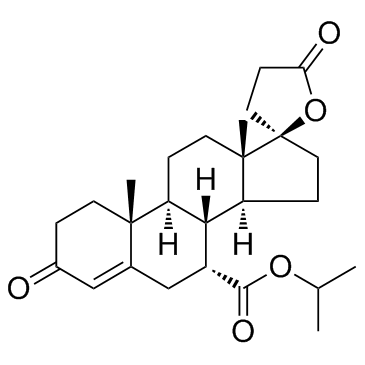Dicirenone |
| Catalog No.GC35862 |
Dicirenone (SC26304) inhibits the effects of Aldosterone on urinary K+:Na+ ratios and the binding of [3H]Aldosterone to renal cytoplasmic and nuclear receptors.
Products are for research use only. Not for human use. We do not sell to patients.

Cas No.: 41020-79-5
Sample solution is provided at 25 µL, 10mM.
Dicirenone (SC26304) inhibits the effects of Aldosterone on urinary K+:Na+ ratios and the binding of [3H]Aldosterone to renal cytoplasmic and nuclear receptors.
Cytoplasmic binding of [3H]Aldosterone and [3H]Dicirenone is similar in magnitude and involves the same set of sites. Under three sets of conditions-(i) in the intact rat, (ii) in kidney slices, and (iii) in reconstitution studies (mixing prelabeled cytoplasm with either purified renal nuclei or chromatin), [3H]Dicirenone does not yield specific nuclear complexes in contrast to the reproducible generation of these complexes with [3H]Aldosterone. In glycerol density gradients, cytoplasmic [3H]Aldosterone receptor complexes sediment at 8.5 S and 4 S in low concentrations of salt and at 4.5 S in high concentrations of salt. Cytoplasmic [3H]Dicirenone receptor complexes sediment at 3 S in low concentrations of salt and 4 S in high concentrations of salt. These results are discussed in terms of an allosteric model of the receptor system. Administration of Dicirenone (SC-26304) alone in doses of 3-600 μg/100 g of body weight has no effect on urinary Na+:creatinine or K+:creatinine ratios. These results are expressed as urinary K+:Na+ ratios. Aldosterone (0.3 μg/100 g of body weight) increases the K+:Na+ ratio 5-fold. This increase is significantly inhibited by 180 μg/100 g of body weight of Dicirenone and completely inhibit by 600 μg/100 g of body weight. To correlate inhibitory action and receptor occupancy, the same doses of Dicirenone are given to rats injected with 0.036 μg of [3H]Aldosterone. A dose of 180 μg of body weight reduces specific binding of Aldosterone in cytoplasmic and nuclear fractions to less than half of the control levels and 600 μg/100 g of body weight eliminated specific binding. The dose of Aldosterone used in the physiological studies is about eight times that used in the binding studies, but both doses are well below saturating amounts[1].
[1]. Marver D, et al. Renal aldosterone receptors: studies with (3H)aldosterone and the anti-mineralocorticoid (3H)spirolactone (SC-26304). Proc Natl Acad Sci U S A. 1974 Apr;71(4):1431-5.
Average Rating: 5 (Based on Reviews and 11 reference(s) in Google Scholar.)
GLPBIO products are for RESEARCH USE ONLY. Please make sure your review or question is research based.
Required fields are marked with *




















